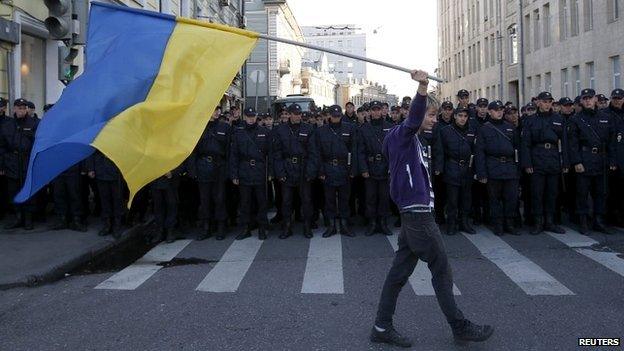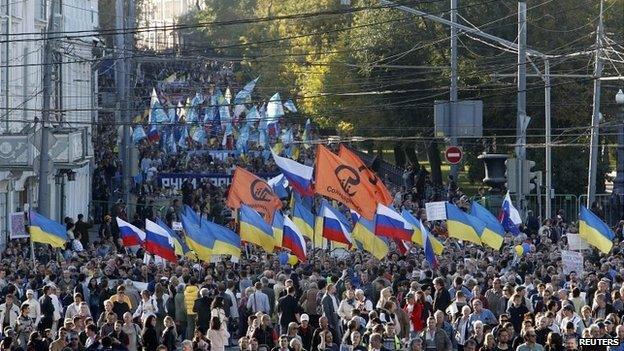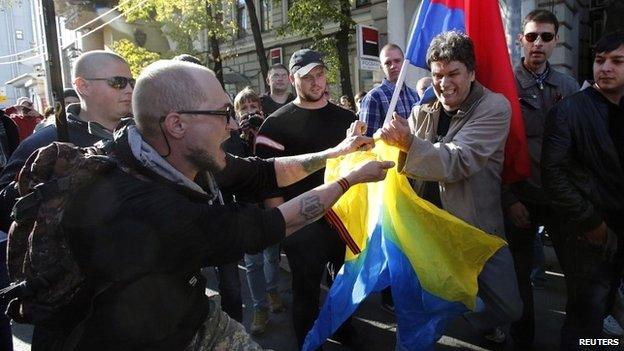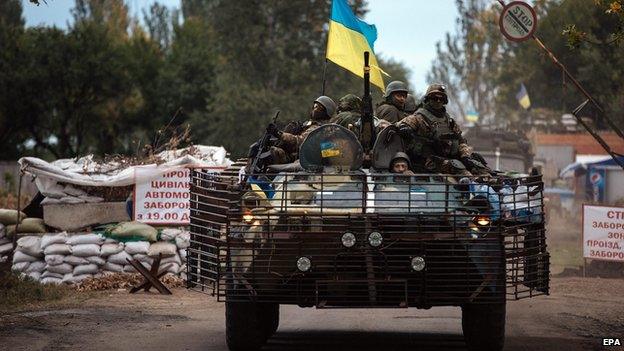Ukraine crisis: Thousands march in Moscow anti-war rally
- Published
The BBC's Sarah Rainsford reports from Moscow
Thousands of people have marched in Moscow to protest against Russia's involvement in the Ukraine conflict.
People carrying Russian and Ukrainian flags chanted "No to war!" and "Stop lying!" Similar rallies took place in St Petersburg and other Russian cities.
Ukraine accuses Russia of arming rebels in the east and sending Russian troops across the border. Moscow denies this.
More than 3,000 people have died in fighting since April.
A truce was agreed on 5 September but there have been repeated violations since then.
The fighting began after Russia annexed Ukraine's southern Crimea peninsula in March - a move condemned by Ukraine and the West.
Moscow police said about 5,000 protesters took part in Sunday's demonstration but a reporter for the AP news agency estimated that the crowd was at least 20,000-strong.
The organisers said the numbers were far higher for a march they described as a protest against Russia's "aggressive foreign policy".

Organisers of the anti-war march in Moscow said they hoped as many as 50,000 people would attend

A large column of protesters waving both Russian and Ukrainian flags marched in central Moscow

Supporters of separatists in Ukraine held their own smaller rally in Moscow, where they ripped a Ukrainian flag
The demonstrators marched from Pushkin Square to Sakharov Avenue in central Moscow.
Police stepped up security in the capital and there were only minor scuffles reported between rival demonstrators.
It is Russia's first major anti-war rally since the fighting began five months ago in Ukraine's eastern Donetsk and Luhansk regions.
A number of supporters of the pro-Russia separatists in Ukraine held their own rally in Moscow.

Social media reaction to Moscow's anti-war rally
Vladimir Varfolomeyev, a journalist from Russia's Ekho Moskvy radio station, on the anti-war march turnout: "50,000, in my view, is a conservative estimate. Most likely it was slightly bigger."
Oleg Kashin, a correspondent with Kommersant newspaper, said: "The party of peace ended up on top today. And the party of war lost. And that's fantastic."
Kristina Potupchik, a pro-Kremlin blogger, wrote: "The organisers preferred to forget the fact that there is currently a ceasefire in Ukraine, which was achieved partly due to [Russian President Vladimir] Putin personally."
"Look at this coven of orcs with flags of Nato and [Ukrainian nationalist group] Right Sector in Moscow. Does Russia need all this pestilence?" former professional boxer Nikolay Valuyev tweeted.
Source: BBC Monitoring


The new agreement seeks to stop the repeated violations of a ceasefire agreed on 5 September
In Ukraine, fighting was reported to be continuing on Sunday close to the city of Donetsk despite an agreement on Friday to set up a 30km (19 miles) buffer zone as part of the Minsk memorandum.
The government in Kiev said its military forces would not pull back until pro-Russian forces stop firing and Russian troops leave. Russia denies that its forces are involved.
Ukrainian military spokesman Andriy Lysenko said violations of the ceasefire continued, telling reporters: "In the last 24 hours we have lost two Ukrainian soldiers, eight have been wounded."
On Saturday, Gen Philip Breedlove, Nato's supreme commander in Europe, said the ceasefire existed "in name only".
General Philip Breedlove: "The situation in Ukraine is not good right now...We have a ceasefire in name only"
He said the numbers of artillery rounds fired recently was comparable to periods before the truce came into effect two weeks ago.
Gen Breedlove said that since last week, some Russian forces inside Ukraine had returned to Russia but remained available to "bring their military force to bear on Ukraine".

Minsk memorandum: Key points
To pull heavy weaponry 15km back each side of the line of contact, creating a 30km security zone
To ban offensive operations
To ban flights by combat aircraft over the security zone
To set up an OSCE monitoring mission
To withdraw all foreign mercenaries from the conflict zone


Are you in Ukraine? How is the conflict affecting you? You can email your experiences to Haveyoursay@bbc.co.uk, external